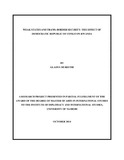| dc.description.abstract | This study sought to identify numerous links between weak states and trans-border security
threats, ranging from terrorism and nuclear proliferation to the spread of infectious diseases,
environmental degradation, and energy security. Criminal groups can thrive off the illicit needs
of weak states, especially those subject to international sanctions; regimes and rebel groups have
been known to solicit the services of vast illicit arms trafficking networks to fuel deadly conflicts
in countries such as the DRC, Liberia, Sierra Leone, Afghanistan, Angola, and Sudan when arms
embargoes had been imposed by the United Nations and other members of the international
community. The study was organized into five chapters: Chapter one introduced the background
content to the topic of research, statement of the research problem, objectives of the study, study
justification, literature review, theoretical orientation and study methodology employed, chapter
two established the understanding, causes and the consequences of weak state where it also
provided an analysis of the cause behind the statelessness, chapter three established the index of
state weakness in the developing world. Moreover, the chapter reviews the scholarly
contributions to understanding state weakness, and it suggests criteria and indicators to capture
statelessness for comparative purposes, chapter four provided a critical analysis of how DRC
weakness affects Rwanda’s’ national security and finally chapter five provided a summary,
conclusion and recommendations. This research employed a descriptive research design to obtain
a secondary data in critical analysis of how DRC weakness affects Rwanda’s national security.
This approach was chosen because the study involves investigating variables which are not easy
to quantify. The study heavily relied on secondary written materials and documents from the
archives were used in collecting secondary data. The data analysis was qualitative and took place
concurrently with data collection. Using mapping aspects, the various variables were categorized
on an ordinal scale. This provided the most manageable way of measuring the variables in the
study. The themes that emerged from the interviews and from document analyses formed the
basis of further collection and summary. The analysis of the final data will make it possible for
themes to be identified and findings to be presented descriptively. The researcher expects to have
limited scope to examine the emerging patterns within this research to inform this study makes
the cross-national comparisons of data with the study situation problematic. The study finding
established the weak states and trans-border security by establishing the effect of democratic
republic of Congo on Rwanda. The paper argues that there are structural causes that underpin the
conflict such as colonial legacy, weak governance, fragility, contested citizenship, greed for
resources, land tenure and group territorial claims. Factors that act as drivers to the conflict such
as spillover effects of conflicts in neighbouring countries, organized armed groups, and
proliferation of Small Arms and Light Weapons (SALW) have also been identified. | en_US |

